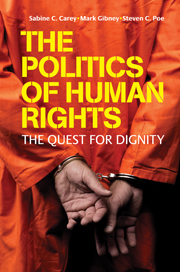Book contents
- Frontmatter
- Contents
- List of text boxes
- List of figures
- List of tables
- List of abbreviations
- Introduction
- Part I Human rights and state responsibilities
- Part II Empirical representations and explanations of human rights violations
- Part III Intervening and rebuilding in the wake of repression
- Bibliography
- Index
Introduction
Published online by Cambridge University Press: 05 June 2012
- Frontmatter
- Contents
- List of text boxes
- List of figures
- List of tables
- List of abbreviations
- Introduction
- Part I Human rights and state responsibilities
- Part II Empirical representations and explanations of human rights violations
- Part III Intervening and rebuilding in the wake of repression
- Bibliography
- Index
Summary
This book is designed for a class on human rights or for the treatment of this subject in related courses. In our view, ‘human rights’ is one of the most important and most interesting subjects. After all, the study of human rights is essentially about how we treat all other people with whom we share this planet. In its essence, striving for the respect of human rights is a quest for human dignity. Human rights are about recognizing, honouring and protecting the human dignity of each one of the six billion people on this planet. When human rights are not protected, the victim's human dignity is thereby ignored. But what this also does is to deny the humanity in all of us.
In this book, we work under the assumption that students study human rights because they are deeply interested in making a positive contribution to the world. Our goal is to build on this interest and this passion. Along with this, our strong sense is that students want to ‘get into’ human rights immediately and we have structured this book with this goal in mind. In that way, this book is less theoretical and less historical than other books in this realm, and every effort has been made to focus on the humanity on which human rights is based.
The reader will also find a much different and more challenging conceptualization of human rights compared with the ‘standard treatment’ of human rights in other textbooks.
- Type
- Chapter
- Information
- The Politics of Human RightsThe Quest for Dignity, pp. 1 - 3Publisher: Cambridge University PressPrint publication year: 2010



